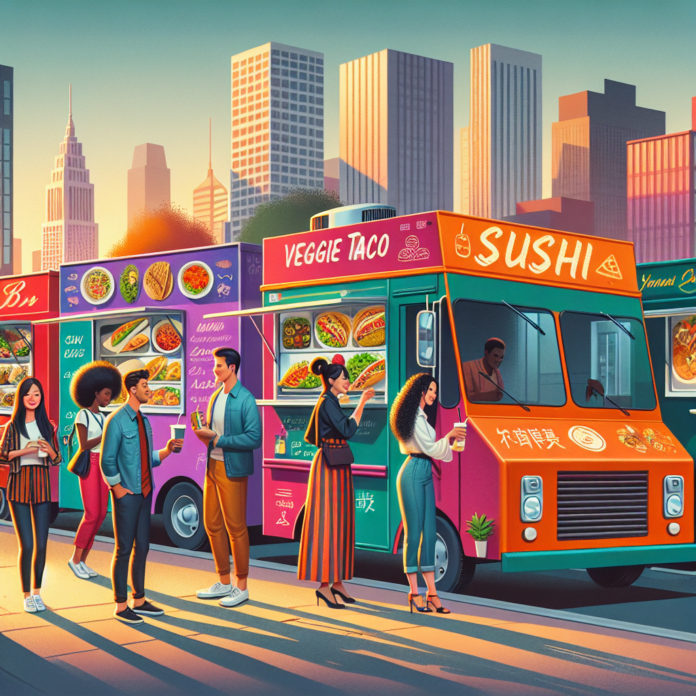Food trucks have become an increasingly popular trend around the world. Once associated only with fast food joints and carnival eats, food trucks have now evolved into diverse, gourmet destinations featuring a variety of cuisine. This urban eatery trend is something more than a passing fad – it is a food revolution that is here to stay. Whether you want to delight in a mouthful of tacos or gratefully grab a gourmet burger, food trucks serve them all. Age or social status does not matter when you are standing in front of a food truck; all you need to have is an appreciation for comfort food with a twist.
Food trucks first emerged in the United States around the late 17th century. These early food trucks were horse-drawn wagons that served late-night workers. As the country industrialized and urbanized, the need for quick and easy meals only grew, leading to the rise of mobile canteens during the 1950s. These “roach coaches” served simple, often pre-packaged, meals to factory workers and construction crews.
However, the modern food truck revolution truly burst onto the scene in 2008, in the midst of the global economic recession. The food truck culture has made having a great meal much cheaper and easier for the consumers, and starting a food business much easier as well for aspiring entrepreneurs. With the rise of social media platforms, including Twitter and Facebook, food trucks have managed to turn their business into a mobile marketing wonder, driving them into the mainstream.
The charm and attraction of food trucks come from their unique combination of delicious, creative food, affordable prices, and location flexibility. The appeal of food trucks is not found in any particular dish but in the overall experience. You get to eat outside, often while standing, which creates a sense of communal engagement. Further, the kitchens are on display, adding authenticity and visibility to what customers consume. No wonder, food trucks are often found parked at festivals, cons, private parties, and anywhere else people gather.
In recent years, this industry has flourished and diversified, with trucks specializing in different cuisines such as Korean BBQ, crepes, vegan options, and more. Further, healthy food options are now available from food trucks. Organic, vegan, and gluten-free delights are now just as likely to be found on a food truck menu as a burger or a hot dog. Gourmet food trucks serving up upscale dishes like lobster rolls and foie gras also form part of this revolution.
Food trucks have not just changed the culinary scene; they have also had a significant impact on urban culture. They have revitalized deserted industrial spaces, brought life to dead streets, boosted tourism, and even been a stepping stone for many successful chefs and entrepreneurs.
Moreover, the food truck industry is a great contributor to the economy. According to a report published by IBIS World, the food trucks industry had an annual growth of 7.5% from 2016 to 2021. The same report predicts the industry to grow an annualized 2.4% to $1.2 billion over the next five years, proving that the popularity of food trucks is not just a blip on the radar.
Conclusion
The rise of food trucks is a consequence of a combination of factors. The food truck movement is shaping the culinary landscape, giving us endless options for dishes and ways to experience food. With its growing acceptance and recognition, it is safe to say that the trend is here to stay. Amid the fast-paced life of today’s urban dwellers, food trucks go a long way in offering a quick, tasty, and novel experience for food lovers. Be it for the taste, the convenience, or the novelty, one thing remains undebatable – the love for food trucks just keeps growing.
FAQs
Q: What factors have contributed to the rise of food trucks?
A: Factors like spontaneity, convenience, affordability, variety, and social media have all contributed to the rise of food trucks.
Q: What makes the food truck industry so lucrative?
A: Lower initial investment, mobility and flexibility, and the ability to directly interact with consumers make the food truck business lucrative.
Q: Why has there been a surge in gourmet food trucks?
A: Gourmet food trucks cater to the new-age consumers who are keen on trying out unique and high-quality meals, even from a mobile vendor. Such trucks offer a novelty dining experience and often serve as platforms for chefs to experiment creatively.
Q: Is the food truck industry solely an American trend?
A: While the trend emerged in the U.S., it has now spread to various parts of the world, including Europe, Asia, and Australia.

